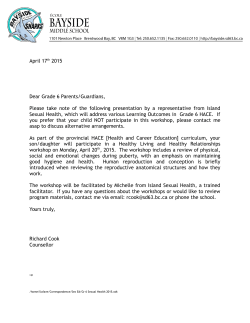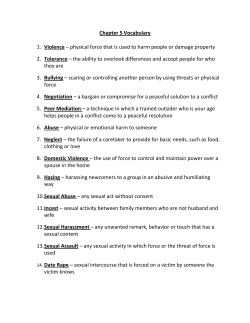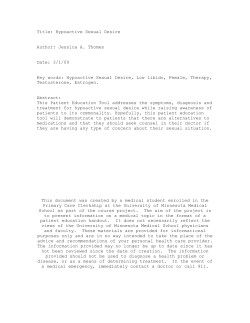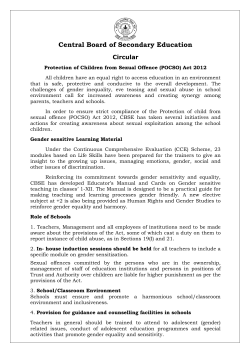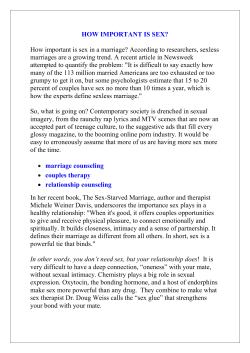
Are men and women socially or sexually monogamous? Prof. Zvi
Are men and women socially or sexually monogamous? Prof. Zvi Zemishlany Tel Aviv University, Israel Sexual function: a bio-psycho-social model • Biology • Individual psychology • Interpersonal psychology • culture Three distinct phases in sexuality • Lust (Libido, Sex Drive) • Attraction (Romantic love) • Attachment Attraction (Romantic Love) - Biology • • • • Dopamine (high) Norepinephrine (high) Serotonin (low) Phentylamine • Brain areas: Ventral Tegmental area Caudate nucleus (dorsal) Attachment • • • Feeling of calm Contentment Emotional union with long-term partner FSD: Decreased Sexual Desire • USA (18-59): low desire (HSDD) 30% Laumann et al, JAMA, 1999 • French Survey (2004) (>35) • Scandinavia (18-74) reduced interest Fugl-Meyer et al. Scand. J. Sexol. 1999 46% 80% 33% All Women have the same excuse Correlates of diminished sexual responsiveness in females • • • • • Relationship duration Number of young children Marital discord Symptoms of anxiety and depression Age Dunn, J Sex Marit Ther 2000; Klusmann et al, Arch Sex Behav; Basson et al, J Sex Med 2004; Eplov et al, J Sex Med 2006 Length of relationship and decrease in sexual desire - women J Sex Med 2008; 1681-1693 Hormones and sexual response in midlife women • Estradiol levels – no influence on frequency of sexual activity. • Testosterone and dehydroepiandrosterone – not related to sexual function domains Dennerstain et al. 2005 German Students • Percent reporting wanting to have sex often Men Women < 1 yr 76% 65% 1-3 yr 74% 44% > 3 yr 76% 26% Klinsmann & Phil, Arch Sex Behav 2002 Partner novelty in sexual functioning Coolidge Effect (Wilson et al, 1963) • Rodents: sexually dominant member, mainly male • Fruit flies (Drosophila)- males (Tan et al., 2013) • Male Chimpanzees (Allen, 1981) • Male rhesus monkeys (Michael and Zumpe, 1978) • Mammalian species Laboratory studies in human • Habituation of arousal to erotic stimuli. • Studies included a novel stimulus trial • Constant stimulus resulted in less subjective and physiological sexual arousal Vs. different slides • The role of attention in habituation. • Most studies done in men (diff. actors) • 98% of men and 80% of women fantasizing about someone other than current partner (2m) "State of affairs” • 55% of married women • 65% of married men • 50% of married women - at least one lover before the age of 40 • 35-55% of the “unfaithful” reported: being happy with their marriage good sex & rewarding family life J. of couple & relationship, 2002 Sexual partners in men and women • LifetimeMen:11.7, Women:7.7 • Desired partners- Men:18, Women:4.5 • Women near ovulation – increased desire for short term relationships. • Both men and women preferred long term (monogamous) relationships. The role of partner- related fascination Relationship satisfaction and fascination for the partner correlated significantly with sexual functioning in women, but not in men. Dopamine and sexual function Involved in desire, arousal and satisfaction Key player in the “reward system” Samuel Johnson: Falling in love is a disease state best cured by _______________ Laura Kipnis Against Love: A Polemic (Pantheon Books, 2003) • “Companionate coupledom” • Desire and commitment do not seem to coexist well • A happy long-term marriage that keeps sexuality alive – is an impossibility Stephen Mitchell Can Love Last? The Fate of Romance Over Time (2002) Inherent difficulties in combining desire and long-term love. “Authentic romance is hard to find and even harder to maintain. It easily degrades into something else. Much less captivating, much less enlivening, …, predictable companionship, or hatred, guilt, and self pity… Romance thrives on novelty, mystery and danger; it is dispersed by familiarity. Enduring love is therefore a contradiction in terms”. Stephen Mitchell – Conts. We endlessly strive to establish in our marriages the safety, permanence, and predictability that we had (or wish we had had) in our childhoods. But it is this emotional pursuit of a safe marriage that we lead to a loss of spontaneity and eventually kill desire. Esther Perel )2006( Mating in Captivity Sexless marriage The trade-off in marriage • Monolithic monogamy • “Energy and persistence conquer all things” (Benjamin Franklin) • The American-Protestant work ethic in the service of degrading passion • Safety, permanence, better care for offspring, pooling resources Going the same way “The opposite of love is not hate, it’s indifference. The opposite of life is not death, it’s indifference.” Elie Wiesel “It take two to make a good marriagesometimes three” (Alexander Dumas) Conclusions Men and women are socially monogamous but not sexually monogamous Social monogamy is accompanied by the expectation of sexual monogamy, creating a dilemma. Married men live longer, have better health and make more money. THANK YOU
© Copyright 2024

